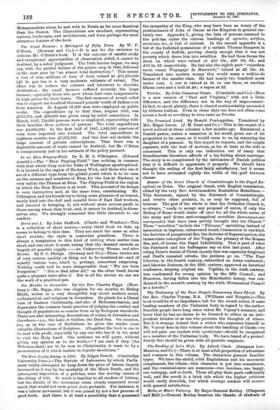The East Anglia Rising in 1381. By Edgar Powell. (Cambridge
University Press.)—The Statute of Labourers, by which Perlis ment vainly attempted to keep down the price of labour, largely increased as it was by the mortality of the Black Death, and the subsequent imposition of a poll-tax, were the moving causes of the rising of 1381. So much is familiar to all readers of history, but the details of the movement when closely examined reveal much that would not seem prim& facie probable. For instance, it was a labour movement, but it was joined by not a few persons of good birth. And there is at least a possibility that it possessed
the sympathy of the King, who may have been as weary of the predominance of John of Gaunt as the Kingdom in general cer-
tainly was. Appendix I., giving the lists of persons assessed to the poll-tax under the various headings of agricolz, artifices, servicutes, &c., is full of interest. In the second appendix is a list of the forfeited possessions of a certain Thomas Sampson in the county of Suffolk, proving clearly enough that it was not poverty which drove him into rebellion. He had three farms the stock on which were valued at £10 16s., ..f.,39 16s. 6d., and .215 Os. 2d. respectively. He had also the eighth part "cujusdam navis vocati Waynpayr de Herewich," valued at .22 13s. 4d. Translated into modern money this would mean a well-to-do farmer of the smaller class. He had nearly two hundred acres under corn. A cow is valued at 5s. on one farm, on another fifteen cows and a bull at £4; a capon at 2d.


















































 Previous page
Previous page